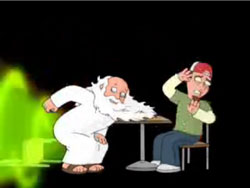Yes, the universe is expanding, and I’m sad to report, it’s speeding up. By this time a dozen billion years or so from now*, all the matter in the universe will be so dissipatted that each celestial body will be beyond the reach of the other’s gravity and the universe will keep expanding and cooling, until it’s nothing more than the proverbial dust in the solar wind. Enjoy it while it lasts.
*assuming you aren’t reading this in 12,000,002,007 A.D.
Why is the universe expanding and where will it all end? This deserves a longer explanation than I’m capable of, involving gravity, dark matter and the cosmological constant. But what I can do is sum up the end of the universe thusly:
Have you ever known an explosion to collapse back in on itself?
 Alternate theories for the end of the universe desperately grasp onto the idea that, hey, wouldn’t it be nice if everything did collapse back together again, so that like, the universe collapsed to form another big bang, then — toke — started up all over again?
Alternate theories for the end of the universe desperately grasp onto the idea that, hey, wouldn’t it be nice if everything did collapse back together again, so that like, the universe collapsed to form another big bang, then — toke — started up all over again?
*cough*
As I reminisced before, the mechanics of the universe are too perfect and deliberate to end with all the majesty of an intergalactic fart. Which is why I present, with absolutely no scientific rigor, how it is possible for the universe to end in that fantasy of stoned astrophysicists everywhere, the big crunch.
Yeah, yeah, I know there’s supergravity, dark energy, blah blah blah. We don’t need to use that scientifically valid thing with no mass and no observable properties known as magic dark matter, we can just use newtonian physics.
As the universe expands, graviational drag forces act less upon the quasars, pulsars and galaxies flying through space. As they expand away from each other, they will speed up, which is exactly what they’re shown to be doing. Eventually their velocity will reach 300,000,000 meters per second: the speed of light. Unfortunately, Einstein’s General Theory of Relativity says you can’t go faster than the speed of light, and here’s why: as an object approaches the speed of light, it takes a greater relative force to keep it accelerating.
I’ve looked and looked, but the vast and shallow wisdom of the internet never seems to go any further than this.
As far as I can tell, the luminescent speed limit only exists because anything moving faster would seem to move back in time, which, uh… it isn’t supposed to do. I guess. Look, it has something to do with time. That’s it. That’s the explanation.
However, in the fraction of a second just after the big bang, the universe expanded from an infinitesimal point to billions of light-years in less time it takes to blink, so it shows there’s at least some kind of precedent for faster-than-light travel.
 We know this will happen because in the astronomically-near future the observable universe will shrink. The rest of the universe will be moving away faster than the speed of light, relative to us at least.
We know this will happen because in the astronomically-near future the observable universe will shrink. The rest of the universe will be moving away faster than the speed of light, relative to us at least.
And according to special relativity, as these bodies speed up, their mass will increase relative to objects outside their frame of reference, meaning they’ll appear to have a greater gravitational effect on the bodies around them, and the universe will begin to draw itself together again on the force that was conjured just from the ether that mass’s high velocity. Think of gravity in this case like the way a speeding subway train’s wake will draw loose newspapers, plastic bags, and other trash along with it. The beauty here is that the actual mass of the universe doesn’t need to increase! The cosmological constant can stay the same and we don’t need to rely on mysterious dark matter to explain it. We can have our cake and eat it too. At the speed of light.
Yes, this does all sound a bit too perfect. And I thought it would’ve taken longer for my writing to descend into yet another crackpot theory polluting the internet. Sure, this is one of those times where the adage “A little knowledge is a dangerous thing” seems applicable and I welcome someone — anyone — take me aside to explain to me why I’m wrong.
[NOTE: I went back and edited this post because reading it sounded like complete and utter nonsense, which may or may no longer be the case.]